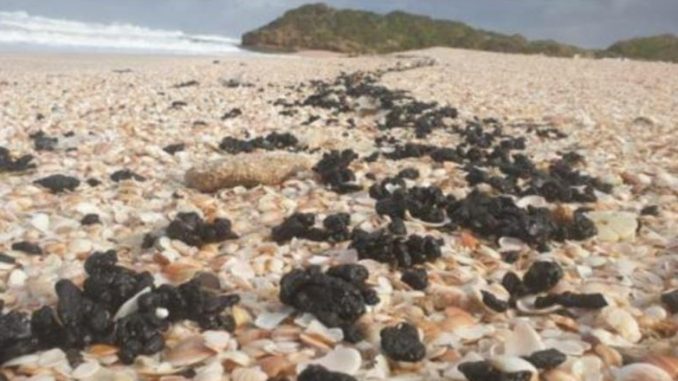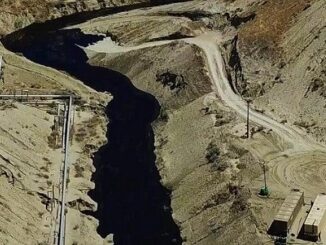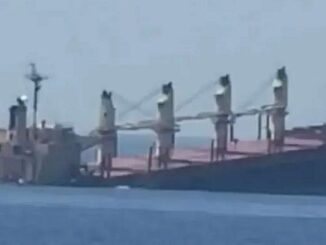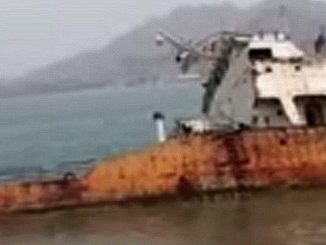
TEL AVIV, Israel, February 28, 2021 (ENS) – The level of tarry pollution on Israel’s Rosh Hanikra Beach near the Lebanese border is now rated medium-heavy, after new lumps of tar washed ashore on Sunday after contractors and volunteers had worked to clean it. New tar was also found on Tel Baruch Beach in Tel Aviv, Bustan Hagalil, and Hamachalim Beach in Haifa.

Israel has been facing an environmental and ecological disaster since tar began washing ashore across the country’s Mediterranean coastline on February 17. The tar landed on Israeli beaches as a result of stormy weather, but the search for the source of the tarry oil is still ongoing.
“The source of the tar is likely an oil spill from a ship, approximately 50 kilometers offshore, outside Israel’s territorial waters,” the Ministry of Environmental Protection, MoEP, speculates.
Israel is working with international bodies to identify the ship that released the tar and bring its owners to justice. At the start of the tar event, the ministry identified 10 ships as potentially suspicious and has since expanded the investigation to dozens of vessels. To date, MoEP has inspected 10 ships, is continuing to inspect other ships, and promises to keep the public informed as the investigation progresses.
The team went to Greece on Saturday to investigate the vessel Minerva Helen in the port of Piraeus. “In the wake of a thorough, professional, and comprehensive inspection conducted by inspectors from the MoEP and the Israeli Shipping and Ports Authority, the team now says the ship was not the source of the pollution,” the ministry said in a statement today.
“The probe was carried out in full cooperation with the Greek authorities, as is customary in these cases, and the arrival of the special MoEP team was coordinated in advance with the Foreign Ministry and the Israeli Embassy in Greece. The Greek Coast Guard also took part in the inspection of the ship. It should be noted that at no stage did the ministry coordinate with the ship, its owner, or any of its representatives,” the ministry stated.

Environmental Protection Minister Gila Gamliel said, “We are committed to making every effort to locate the ship responsible for polluting the shores of Israel. We have a moral obligation to the public, animals, and nature that have been harmed as a result of the pollution.”
“This pollution has an address – we will not ignore this environmental crime and we will take all measures possible in order to identify the offender,” Gamliel said.
Tar pollution has been detected on some 160 km of Israel’s 195 km coastline, from Betzet Beach in the north to Nitzanim Beach in the south.
Volunteers across the country have joined forces with the ministry, local authorities, the Nature and Parks Authority, and EcoOcean, to collect it. Volunteers are only permitted to take part after receiving guidance and training, as tar can be harmful if not handled properly.
Gamliel, said, “We thank the many thousands of volunteers who collected tar on most of the beaches in the country; it is exciting and heartwarming. After the government approved the budget yesterday, we are entering the next stage, which will allow the public to return to our beautiful beaches. We hope to complete this formidable project in the coming weeks so that the bathing season can open in time.”
On February 23, Israel’s government approved the allocation of NIS 45 million (US$13.7 million) toward a plan to clean up the country’s shoreline after the massive tar spill. The government began to transfer these funds to local authorities on February 25 to pay for beach cleanup and treatment.
Prime Minister Benjamin Netanyahu said in a statement that the event was “a huge ecological disaster, with a thousand tons of oil and tar piling up on our shores.”
“We must act quickly before it seeps into the ground, especially in the rocky areas where it will damage and stay with us for many years. This is why we are acting quickly and the plan has been approved. The budget assistance will help save our beaches. We will protect our beaches and we will protect our environment,” Netanyahu said.
As a precautionary measure, the Israeli Health Ministry has banned the sale of fish and seafood from the Mediterranean indefinitely.
The Ministry of Environmental Protection has begun the removal of some 1,200 tons of tar and other debris that has washed ashore onto Israeli coastlines over the past week. The operation, being conducted by the Environmental Services Co., involves removal, sorting, sampling, and analysis of the materials. The Ministry’s Fund for the Prevention of Sea Pollution will pay NIS 10 million (US$3 million) of the allocation to Environmental Services Co. for conducting the operation.

Iris Hann, CEO of the nonprofit Society for the Protection of Nature in Israel, explained on the group’s website how she felt trying to clean the wildlife, “Over the weekend I, together with thousands of volunteers, were at the beaches cleaning sticky, black tar oil off of dead and dying animals. My heart broke as I found dead baby turtles, birds, fish and other marine animals stiff and lifeless. Their bodies completely coated with a sticky, toxic tar that gave them no chance. It is impossible for me to remain indifferent in the face of such an ecological catastrophe.”
There are two plans being advanced by the Israeli government that Hann warns will increase the risks of another spill and environmental disaster.
The government plans offshore gas drilling 30 km (20 miles) off Palmachim Beach. Israel discovered in 2009 that it had large reserves of natural gas off its Mediterranean coast.
“Even more alarmingly,” says Hann, “plans are in motion to construct an oil transfer port in Eilat. Massive tankers full of oil will be welcomed at the edge of our coral reef. I do not want to imagine or even think about the potential damage an oil leak would have on Eilat’s coral reefs and marine life. This is why I’m asking you now to make a donation to prevent both these plans from becoming a reality.”
The group is also fighting to enshrine the National Emergency Plan for the Treatment of a Marine Pollution Incident in Israeli law. The National Emergency Plan would fund specialized equipment and staff to be on standby to deal with spills quickly before they get out of control.
Israel’s government on Sunday urged people not to go to the beaches. A joint notice issued by the Health, Interior and Environmental Protection Ministries called on the public “not to go to beaches to swim, or do sports or leisure activities until further notice. Exposure to tar could harm public health,” they added.
The Israel Defense Forces say they will deploy units to areas affected by the tar spill from Rosh Hanikra, near the Lebanese border, to the port city of Ashkelon in the south.
Copyright Environment News Service (ENS) 2021. All rights reserved.
© 2021, Environment News Service. All rights reserved. Content may be quoted only with proper attribution and a direct link to the original article. Full reproduction is prohibited.



